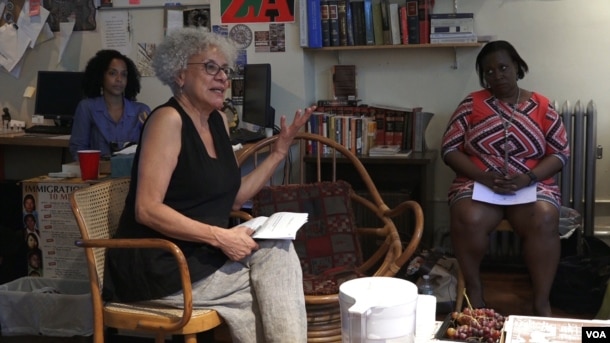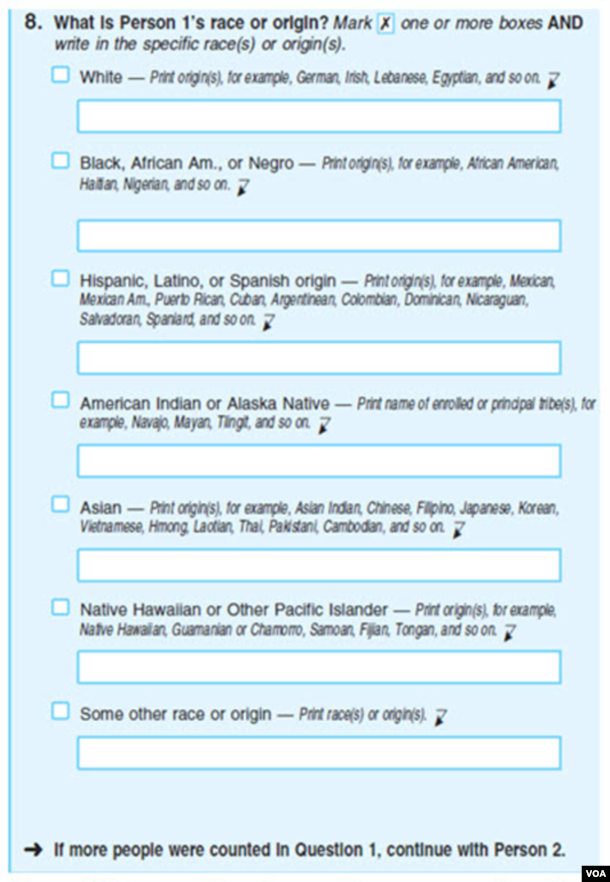
Race Question in US Census Draws Scrutiny, Criticism
VOA NEWS
RAMON TAYLOR
NEW YORK, NEW YORK — When counting errors occur in data collection, the implications can be far-reaching. In the case of the U.S. Census Bureau, entire communities may be left underserved.
Imagine, for a moment, you are a Latino living in the United States, and do not self-identify as either white or black.
On the U.S. Census form, how would you identify yourself in question six — the one about race?

Upon studying your options, you notice that Filipino, Korean and Vietnamese are considered races — and not ethnic groups — so you ask yourself, «Should I fill in my country under the category ‘Some other race?'»
Such situations are not rare, and they remain problematic.
After all, the Census questionnaire, conducted just once per decade, helps the federal government determine funding allocations for public goods — e.g. education, sanitation and infrastructure — in communities across the country, along with the apportioning of congressional districts.
Community forum
In a midtown Manhattan meeting organized by the Black Alliance for Just Immigration (BAJI), a group of Latino and African diaspora community leaders sat with representatives of the Census Bureau to discuss possible changes to the 2020 questionnaire.
In typical New York fashion, there was no shortage of heated pizza or dialogue.
«You can’t keep doing the same thing over and over again and expect better results,» asserted Miriam Jiménez Román, executive director of the Afro-Latin@ Forum.

Miriam Jiménez Román, Executive Director of the Afro-Latin@ Forum, speaks with Census Bureau representatives and community organizers in New York, Aug. 10, 2016. (Photo: R. Taylor / VOA)
Jiménez Román, who also serves as adjunct faculty member of New York University’s Department of Social and Cultural Analysis, told VOA that listing ethnic communities as racial groups in the Census questionnaire is inherently problematic.
«They say that we are the ones that are confused — that a Latino doesn’t understand race. But clearly the Census Bureau doesn’t understand it either,» she said.
2020 Census
The Census Bureau is no stranger to self-evaluation. Since the program was founded in 1902, it has undergone extensive research and testing, along with continuous change on the topic of race and ethnicity.
The bureau conducted a comprehensive «Race and Hispanic Origin Alternative Questionnaire Experiment» (AQE) in 2010, aimed at increasing reporting and reliable results about race and ethnic groups, while reducing the reporting of “Some other race.”
«With the projected steady growth of the Hispanic population, the number of people who do not identify with any OMB [Office of Management and Budget] race categories is expected to increase,» wrote Roberto Ramirez, Population Division assistant chief for the U.S. Census Bureau, in an email to VOA.
UP CLOSE: See race and ethnic categories used each decade since 1790, in accordance with the U.S. Office of Management and Budget (OMB) Classification Standards.

Image courtesy of U.S. Census Bureau
Based on the experiment’s results, the Census Bureau conducted a comprehensive test last year to examine what variations in question formatting might enable people «to more fully and more accurately self-identify their race and/or ethnicity.»
Ramirez noted that by combining race and ethnicity questions into one category, the «Some other race» category was reduced to under one-half percent.
«We know from AQE research that this is largely due to Hispanics choosing their own identity (i.e. only Hispanic) in the combined question format,» Ramirez said. «Overall, when a Hispanic category is provided as a response option, ‘Some Other Race’ becomes one of the smallest response categories.»
Not about semantics
Still, the city’s diaspora nonprofits hope the Census can accurately address the concerns of multi-racial and multi-ethnic groups, such as Middle Eastern and North Africans (META) — the OMB definition of White — and Afro-Latinos.

A sample combined race and ethnicity question, tested by the U.S. Census in 2010. (Image courtesy U.S. Census Bureau)
Tiffany Wheatland, community organizer and member of the Pan African Campaign Steering Committee, argued that the Census needs reform.
«We want to challenge them to say, it’s not about trying to figure out semantics,'» Wheatland said. «It is saying that the system itself and the methodology for the Census is completely flawed.»
Wheatland says that in cities like New York, the categories for blacks and African Americans don’t cover the full range of black diaspora communities.
«Someone would say, well, I am black and I am from Brazil, or I am Afro-Latino or black and from Haiti,'» she said. «People need to be able to identify as being a black and whatever else they are. They shouldn’t have to choose between identities.»
Future results
Despite likely changes to both its wording and categories, Wheatland and Jiménez Román are not optimistic that the 2020 Census will accurately represent their communities.
Ramirez says the Census has worked tirelessly over the past half-decade, and believes it will soon pay off, to reflect both the diversification and complexity of American identities in 2020.

